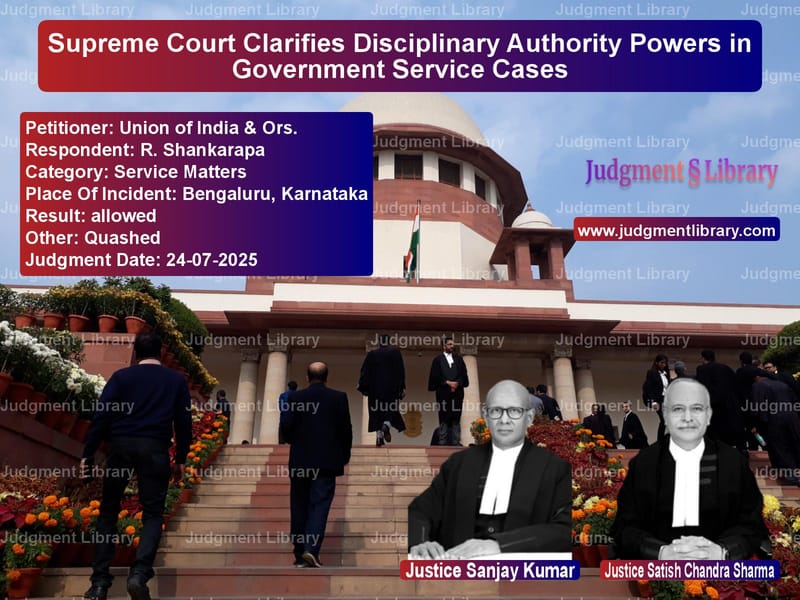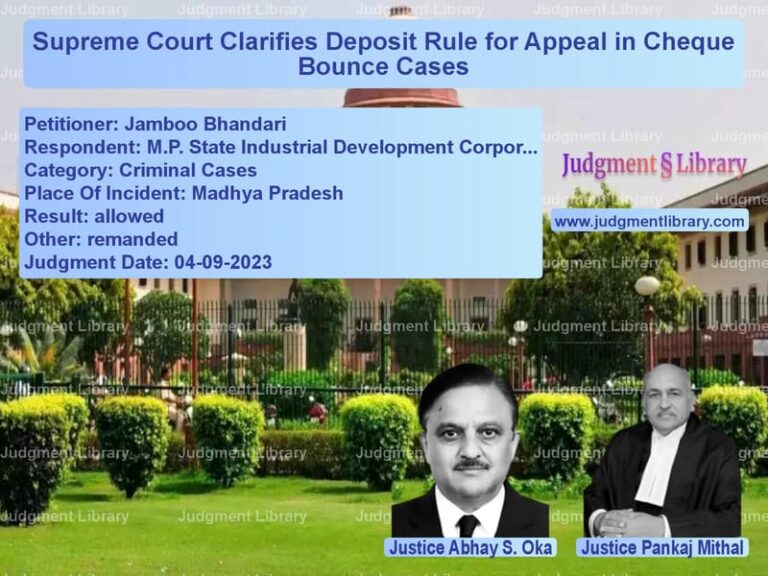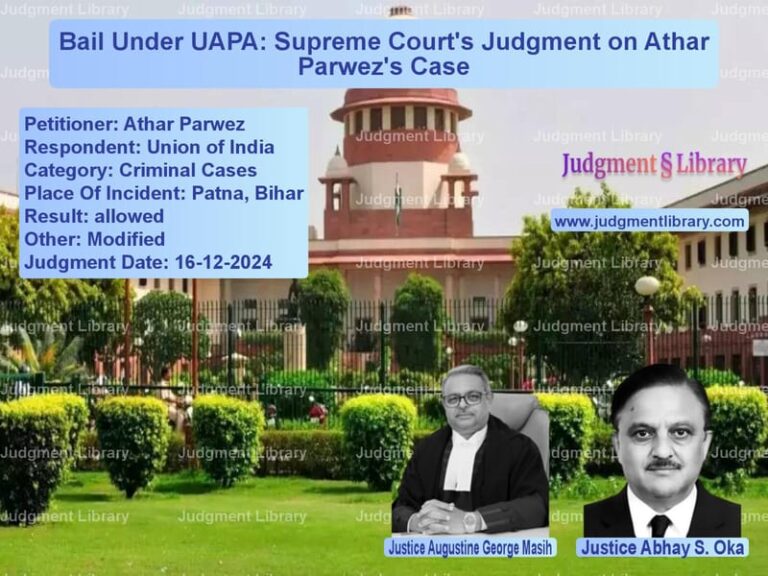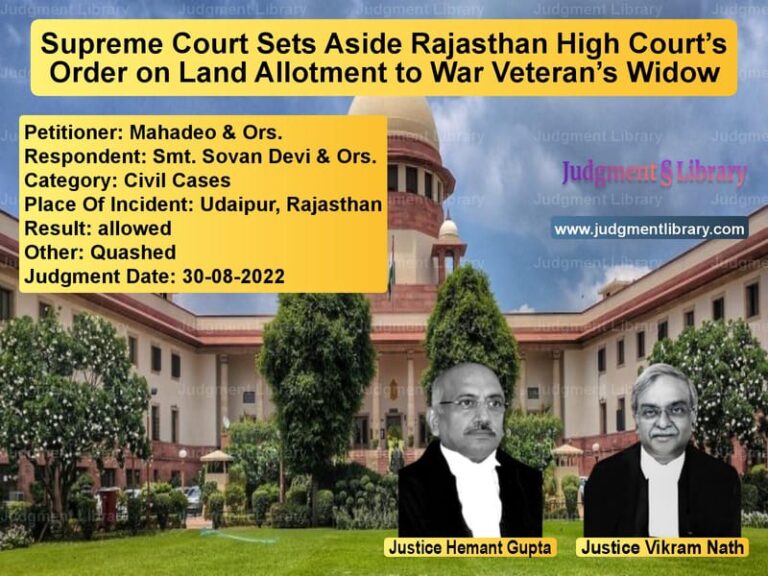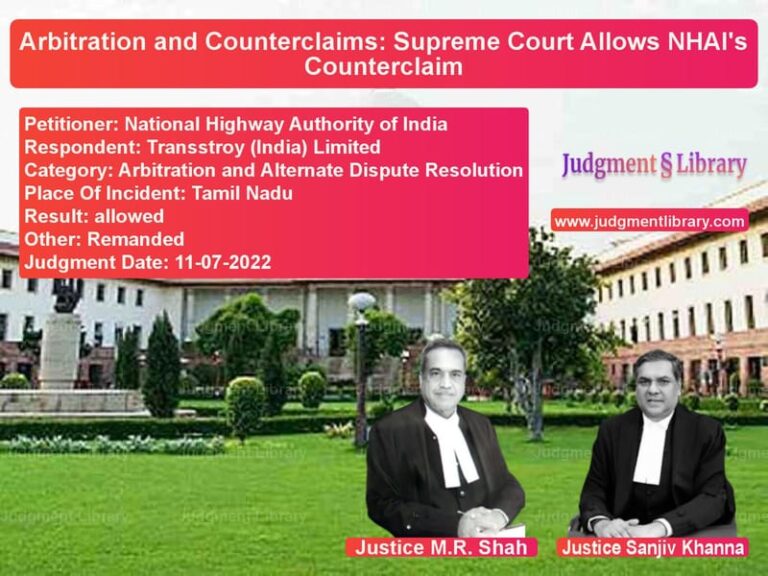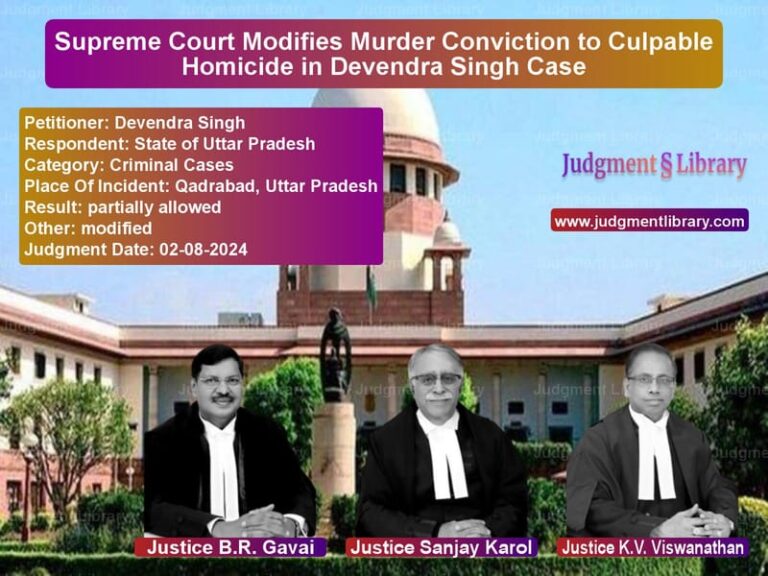Supreme Court Clarifies Disciplinary Authority Powers in Government Service Cases
In a significant ruling that clarifies the powers of disciplinary authorities in government service matters, the Supreme Court of India delivered a judgment on July 25, 2025, that has far-reaching implications for administrative law and disciplinary proceedings in public service. The case involved a retired Sub Divisional Engineer from the Department of Telecommunications who had been challenging disciplinary proceedings initiated against him on corruption charges. The legal battle, which spanned nearly two decades, centered around a crucial question: Can an authority competent to impose only minor penalties initiate disciplinary proceedings that could lead to major penalties? The Supreme Court’s answer to this question has provided much-needed clarity on the interpretation of Rule 13(2) of the Central Civil Services (Classification, Control and Appeal) Rules, 1965.
The case originated from disciplinary actions taken against R. Shankarappa, who served as Sub Divisional Engineer in the Department of Telecommunications and retired on May 31, 2018. The respondent had faced serious legal troubles dating back to 2003 when the Central Bureau of Investigation prosecuted him in two separate cases. The first case, Special CC No. 42/2003, involved charges under Sections 7 and 13(2) read with Section 13(1)(d) of the Prevention of Corruption Act, 1988, for allegedly demanding and accepting a bribe of Rs. 1 lakh from a contractor. The second case, Special CC No. 92/2003, was filed under Section 13(1)(e) read with Section 13(2) of the Prevention of Corruption Act for allegedly possessing assets disproportionate to his known sources of income. The respondent was convicted in both cases, though he preferred criminal appeals before the High Court, which stayed his conviction and sentence in 2014. These criminal appeals remained pending at the time of the Supreme Court’s judgment.
Parallel to the criminal proceedings, the Department of Telecommunications initiated disciplinary actions against the respondent. Two charge-sheets were issued under Rule 14 of the Central Civil Services (Classification, Control & Appeal) Rules, 1965 – the first on May 27, 2006, relating to the trap case, and the second on December 4, 2008, concerning the disproportionate assets case. What followed was extensive litigation, with the respondent filing as many as six cases before the Central Administrative Tribunal in Bengaluru, making various attempts to challenge and delay the departmental inquiry.
The core legal issue that eventually reached the Supreme Court concerned the competence of the authority that issued the charge-sheets. The respondent raised a specific ground before the Tribunal that the charge-sheets had been issued by the Principal General Manager, BGTD, Bengaluru – an authority competent to inflict only minor penalties. According to the respondent, since the charge-sheets were issued under Rule 14 of the CCS CCA Rules for imposing major penalties, they required approval from the appointing authority competent to inflict major penalties. The respondent heavily relied on the Supreme Court’s judgment in Union of India and Others Vs. B.V. Gopinath reported in (2014) 1 SCC 351 and prayed for quashing of the disciplinary proceedings.
The Central Administrative Tribunal dismissed the respondent’s Original Application, holding that the charge-sheet and disciplinary proceedings did not warrant any interference as they had been issued by a competent disciplinary authority. The Tribunal reasoned that a disciplinary authority empowered to inflict minor penalties could issue a charge-sheet under Rule 14 of the CCS CCA Rules even for inflicting major punishment, provided that the final punishment order would be passed by the disciplinary authority empowered to impose major penalties.
Unsatisfied with the Tribunal’s decision, the respondent approached the High Court of Karnataka through Writ Petition No. 14475 of 2022. The High Court, in its order dated November 18, 2022, allowed the writ petition, concluding that in cases where a charge-sheet has been issued under Rule 14 of the CCS CCA Rules by an authority empowered to inflict only minor penalties, the charge memo must be approved by the authority competent to inflict major penalties. This decision by the High Court prompted the Union of India to approach the Supreme Court through a special leave petition.
Before the Supreme Court, the arguments from both sides were sharply contrasted. The learned counsel for the petitioner-Union of India vehemently argued that the High Court’s reliance on the B.V. Gopinath judgment was misplaced. They contended that the statutory provisions governing the field empowered the disciplinary authority to issue a charge-sheet for major penalties even though the authority issuing it was competent to inflict only minor penalties. The petitioner’s counsel emphasized that the statutory framework clearly allowed for such initiation of proceedings.
On the other hand, the learned counsel for the respondent strenuously argued against Supreme Court interference, maintaining that the High Court’s judgment was squarely covered by the verdict in B.V. Gopinath’s case. The respondent’s counsel insisted that the requirement for approval from the higher authority was essential for maintaining the integrity of disciplinary proceedings involving major penalties.
The Supreme Court, after hearing both parties at length and thoroughly perusing the record, delivered a judgment that carefully analyzed the statutory provisions and distinguished the precedent relied upon by the High Court. The bench comprising Justice Sanjay Kumar and Justice Satish Chandra Sharma examined Rule 13 of the Central Civil Services (Classification, Control and Appeal) Rules, 1965, which deals with the authority to institute proceedings. The Court paid particular attention to Rule 13(2), which states: ‘A disciplinary authority competent under these rules to impose any of the penalties specified in clauses (i) to (iv) of rule 11 may institute disciplinary proceedings against any Government servant for the imposition of any of the penalties specified in clauses (v) to (ix) of rule 11 notwithstanding that such disciplinary authority is not competent under these rules to impose any of the latter penalties.’
The Court’s analysis of this provision was crucial to its decision. The judges observed that ‘A plain reading of Rule 13(2) of the CCS CCA Rules specifies that a disciplinary authority competent under the rules “may institute disciplinary proceedings”.’ When this rule was read alongside Rule 14 and Appendix 3 of the CCS CCA Rules, the Court found it ‘very clear that an authority empowered to inflict minor penalties (in the present case, the General Manager) can certainly issue a charge-sheet even for imposition of major penalties.’
The Court made a significant distinction between the present case and the B.V. Gopinath precedent that had been relied upon by the High Court. The judges noted that ‘This Court has carefully considered the judgment delivered in the case of B.V. Gopinath (supra). The aforesaid case was in respect of an IRS Officer Mr. B.V. Gopinath who was appointed as an Additional Commissioner of Income Tax, and the grievance raised was that the charge-sheet against him was not approved by the Finance Minister, whereas, an office order dated 19.07.2005 contained a requirement of such approval. In the present case, there is no such office order in respect of Department of Telecommunication and the statutory provisions governing the field also do not provide for any such approval from the Member, Telecommunications Commission.’
This distinction proved pivotal in the Court’s reasoning. The absence of any specific office order requiring approval from higher authorities in the Department of Telecommunications, combined with the clear language of Rule 13(2), led the Court to conclude that the issuance of charge-sheet by the General Manager, Telecommunications could not be faulted. The Court emphasized that ‘In the present case, the guilt of the respondent after following due process of law has been established. The inquiry does not suffer from any procedural irregularity and the charge-sheet has been issued by the competent disciplinary authority. The final order has been passed after following the due process of law by the competent disciplinary authority empowered to inflict major penalty.’
The Supreme Court’s judgment reinforces the principle that disciplinary proceedings must be examined within the framework of the specific statutory provisions governing them. The Court’s interpretation of Rule 13(2) affirms that the initiation of disciplinary proceedings and the imposition of final penalties can be done by different authorities as long as the statutory requirements are met. This approach ensures that disciplinary proceedings can be initiated promptly while maintaining necessary safeguards through the requirement that major penalties can only be imposed by higher authorities.
The implications of this judgment are significant for administrative law and government service matters. It provides clarity on the division of powers between authorities initiating disciplinary proceedings and those imposing final penalties. The ruling emphasizes that unless specific rules or office orders require approval from higher authorities for initiating proceedings, the statutory framework under the CCS CCA Rules permits authorities competent to impose minor penalties to initiate proceedings that could lead to major penalties, with the actual imposition of such major penalties reserved for higher authorities.
This judgment also highlights the importance of examining the specific statutory context of each case rather than applying precedents mechanically. The Supreme Court’s careful distinction of the B.V. Gopinath case demonstrates the contextual nature of legal interpretation in service matters, where differences in departmental rules and office orders can lead to different legal requirements.
For government employees and administrative authorities, this judgment serves as an important reference point for understanding the scope of disciplinary powers. It confirms that the initiation of disciplinary proceedings and the final decision on penalties can involve different levels of authority, provided the process complies with the specific rules governing that service. The ruling balances the need for efficient initiation of disciplinary proceedings with the protection of employees’ rights through the requirement that major penalties can only be imposed by appropriately higher authorities.
The Supreme Court’s decision to allow the appeal and set aside the High Court’s order reaffirms the validity of the disciplinary proceedings initiated against the respondent. The Court held that ‘the proceedings initiated under charge memos bearing No. VIG/12-285A/2005/6 dated 27.05.2006 and No. VIG/RS-SDE/BGTD/2008/37 dated 01.12.2008 both issued by Principal General Manager, BGTD, Bengaluru (Respondent No.4 herein) are held to be validly initiated.’ This conclusion brings legal certainty to a long-standing dispute and provides important guidance for similar cases in the future.
In the broader context of administrative law, this judgment contributes to the evolving jurisprudence on disciplinary proceedings in government service. It reinforces the principle that statutory interpretation must be grounded in the specific language of the relevant provisions rather than general assumptions about administrative hierarchy. The Court’s approach demonstrates careful attention to the text of the rules while considering the practical realities of administering disciplinary proceedings in large government departments.
The judgment also implicitly acknowledges the importance of allowing departmental authorities appropriate flexibility in initiating disciplinary actions, while maintaining necessary checks and balances through the separation of initiation and final decision-making powers. This balanced approach serves the interests of both administrative efficiency and employee protection, ensuring that disciplinary proceedings can be initiated promptly when necessary, while major penalties remain subject to higher-level scrutiny.
As government administrations continue to evolve and face new challenges, judgments like this one provide valuable guidance on interpreting disciplinary procedures. The Supreme Court’s clear analysis of Rule 13(2) of the CCS CCA Rules will serve as an important precedent for future cases involving similar questions about the powers of disciplinary authorities. The judgment’s emphasis on the specific statutory context and its distinction of earlier precedents also offers a model for how courts should approach such interpretive questions in the future.
Petitioner Name: Union of India & Ors..Respondent Name: R. Shankarapa.Judgment By: Justice Sanjay Kumar, Justice Satish Chandra Sharma.Place Of Incident: Bengaluru, Karnataka.Judgment Date: 24-07-2025.Result: allowed.
Don’t miss out on the full details! Download the complete judgment in PDF format below and gain valuable insights instantly!
Download Judgment: union-of-india-&-ors-vs-r.-shankarapa-supreme-court-of-india-judgment-dated-24-07-2025.pdf
Directly Download Judgment: Directly download this Judgment
See all petitions in Disciplinary Proceedings
See all petitions in Public Sector Employees
See all petitions in Employment Disputes
See all petitions in Judgment by Sanjay Kumar
See all petitions in Judgment by Satish Chandra Sharma
See all petitions in allowed
See all petitions in Quashed
See all petitions in supreme court of India judgments July 2025
See all petitions in 2025 judgments
See all posts in Service Matters Category
See all allowed petitions in Service Matters Category
See all Dismissed petitions in Service Matters Category
See all partially allowed petitions in Service Matters Category

